Stay in the know on all smart updates of your favorite topics.
Waag Open: van wie is de ruimte?

In de ruimte is steeds meer technologie te vinden: satellieten voor mobiel netwerk, voor weer- en klimaatmetingen en voor oorlogsvoering. Hoeveel voller kan het daarboven worden en wat hebben we daar eigenlijk over te zeggen? Op donderdag 2 oktober gaan we in gesprek met kunstenaar Michele Boulogne en antropologe Danick Trouwloon over technologie in de ruimte en de invloed daarvan op onze perceptie van de aarde.
> Hoe zien wij de aarde vanuit de ruimte? Van een afstand lijkt het een rustgevende blauwe bol. Maar in werkelijkheid staat de wereld in de fik.
De van oorsprong Frans-Caribische kunstenaar Michèle Boulogne onderzoekt hoe klimaatverandering begrepen kan – en moet – worden door de ogen van lokale gemeenschappen. De Nederlands-Caribische onderzoeker Danick Trouwloon onderzoekt ecologisch beheer en klimaatverandering in relatie tot de bevolking op de verschillende eilanden. Tijdens Waag Open gaan zij met Waag’s Miha Tursic in gesprek over wat de ruimte betekent voor verschillende culturen, ons beeld van de aarde en het klimaat, en hoe technologie én wijzelf daar invloed op hebben.
Kom op donderdag 2 oktober naar Waag Open en laat ons weten hoe jij de aarde ziet!
Programma
| 19:30 - 19:45 uur | Welkom & introductie |
|---|---|
| 19:45 - 21:15 uur | Interactief gesprek met Michele Boulogne, Danick Trouwloon en Miha Tursic |
| 21:15 - 21:30 uur | Napraten & borrel |
Waag Open
Elke eerste donderdagavond van de maand opent Waag haar deuren! Kom langs om te discussiëren en te doen. Want we gaan niet alleen in discussie over maatschappelijke thema's en de toekomst – je leert daarnaast ook altijd iets praktisch. Iets dat je altijd al hebt willen uitproberen, zoals de 3D-printer in het FabLab, of juist iets dat je nooit had verwacht, zoals uitpluizen hoe DNA in elkaar zit in ons biotech-lab. Waag Open vindt plaats in de maakplaatsen op de eerste en tweede verdieping van het historische Waaggebouw op de Nieuwmarkt.
Toegankelijkheid
Mocht je krap bij kas zitten en wel graag aan dit evenement willen deelnemen, neem dan contact op met sanna [@] waag [punt] org.
Het programma is een resultaat van het More-than-planet project en is mede mogelijk dankzij het 3Package Deal programma van het AFK dat Michele Boulogne’s werk ondersteunt.
“We’re not just creating technology for cities—we’re creating better cities for people.” From Global Goals to Local Action: How Amsterdam Is Building a Smarter, Fairer City
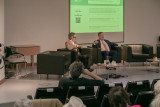
As the world grapples with massive challenges—climate change, rapid urbanisation, digital disruption, and growing inequality—some cities are not waiting for top-down solutions. They are rolling up their sleeves and experimenting with new ways to improve life for everyone, block by block. Amsterdam is one of those cities.
That’s why I was proud to share Amsterdam InChanges approach to smart, inclusive urban innovation at the #CIPPCD2025 conference in Aveiro.
Through our open innovation platform, <strong>Amsterdam InChange</strong>, the city has become a global leader in turning lofty global ambitions into practical, local action. But Amsterdam’s model isn’t built around flashy tech or utopian blueprints. Instead, it’s grounded in an essential question: How can we use innovation to improve people’s everyday lives?
Local Action for Global Challenges
Amsterdam understands that the climate crisis, digital transition, and social inequality can’t be solved by government alone—or by technology alone. That’s why it launched Amsterdam Smart City in 2009 as a public-private partnership. What began as small-scale energy-saving pilots has grown into a community of over 8,500 members, coordinating more than 300 projects across the city and beyond.
The approach is rooted in co-creation. Citizens, companies, knowledge institutions, and government actors come together to design, test, and scale solutions that serve the public good. The values that guide the network are clear: people first, openness, transparency, learning by doing, and public value.
The Doughnut as a Compass
Amsterdam was the first city in the world to embrace Doughnut Economics as a guiding framework. The “City Doughnut,” developed with economist Kate Raworth, helps policymakers balance the city’s ecological footprint with the social foundations that all citizens need: housing, education, health, equity, and more. It’s a tool to align every local decision with both planetary boundaries and human dignity.
This framework has inspired circular construction strategies, neighbourhood energy co-ops, and more inclusive procurement policies. It shows that global concepts can become real when grounded in local practice.
Making Innovation Inclusive
One of Amsterdam’s core beliefs is that smart cities must be <strong>inclusive cities</strong>. That means tackling issues like <strong>mobility poverty</strong>, where rising transport costs and digital-only services make it harder for low-income or elderly residents to get around.
Through the <strong>Mobility Poverty Challenge</strong>, Amsterdam partnered with the Province of North Holland and researchers from DRIFT to understand where and how exclusion occurs—and to design better public mobility systems. Pilot ideas like a “Mobility Wallet” (a subsidy for essential travel) and more inclusive digital apps emerged from real conversations with affected residents.
The same inclusive mindset guides Amsterdam’s digital transformation. In the suburb of Haarlemmermeer, officials flipped the script on e-government. Instead of asking citizens to become “digitally skilled,” they asked how government systems could become more <strong>humane</strong>. This led to simplified interfaces, better access to services, and ultimately more trust.
Responsible Tech and Energy from the Ground Up
Tech transparency is another pillar of the Amsterdam model. The city runs the world’s first <strong>Algorithm Register</strong>, giving the public insight into how AI and automated systems are used in services—from traffic enforcement to housing applications. Anyone can access this register, offer feedback, and better understand how digital decisions are made.
In the energy space, the city supports both bold innovation and careful upscaling. At the <strong>Johan Cruijff ArenA</strong>, used electric vehicle batteries store solar energy, powering concerts and matches with clean backup power. At the same time, a coalition of partners led by Amsterdam InChange is working to scale up Local Energy Systems by collecting lessons learned and creating a toolkit for community-led energy.
What Makes It Work?
If there’s one secret to Amsterdam’s success, it’s the governance model: small, neutral facilitation teams guiding large multi-stakeholder coalitions, anchored by public trust and shared purpose. Regular Demo Days allow project teams to showcase progress, get feedback, and adapt. This culture of transparency and iteration helps avoid the so-called “innovation graveyard,” where pilot projects go to die.
The city also embraces failure—as long as it’s shared and learned from. Reports like “Organising Smart City Projects” openly list lessons, from the importance of strong leadership to the need for viable business models and continuous user involvement.
An Invitation to Other Cities
Amsterdam’s smart city is not a blueprint—it’s a mindset. Start with your biggest local challenge. Bring the right people together. Make space for experimentation. Build bridges between local and global. And, above all, put citizens at the centre.
As international smart city ambassador Frans-Anton Vermast puts it: “We’re not just creating technology for cities—we’re creating better cities for people.”
The III International Conference on Public Policies and Data Science
Digital Society School - Transformation Learning Programme Info session
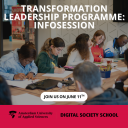
Call to all aspiring leaders!
Are you looking for the next step in advancing your leadership and management skills in alignment with your current role?
Join our upcoming info session on June 11th to learn more about the Transformation Leadership Programme (TLP) – Digital Society School’s part-time programme designed for professionals ready to lead change in the digital and sustainable transition.
We’re looking for Netherlands-based professionals with a Master’s degree and at least 2 years of relevant work experience, particularly with skills in project and team management.
During the info session we will be joined by former Transformation Owners from the TLP track who will share their own experiences during the programme.
The info session will take place online on June 11th 16:00 CET. See you then!
Waag Open: Plataan-check

Er zijn allerlei manieren om luchtkwaliteit te meten, met sensoren, filters of zelfs met planten! Verken met Urgenda de mogelijkheden van natuurlijke sensoren: boomschors van platanen. Deze Waag Open vormt de aftrap van de landelijke actie van Urgenda: De plataan-check.
Platanen kunnen met hun schors veel vertellen over de hoeveelheid fijnstof in hun omgeving. In hun bast slaan ze (fijn)stof uit hun omgeving op. Onderzoekers kunnen met laboratoriumonderzoek uit de bast aflezen hoeveel fijnstof er in de omgeving van de boom is uitgestoten.
Samen met Urgenda verzamelen we tijdens Waag Open boomschors van de plataan. Daarbij vertelt Urgenda hoe plataanschors inzicht geeft in de hoeveelheid fijnstof in Nederland. Daarnaast leidt Imme Ruarus, hoofd van Waag’s Smart Citizens Lab, de avond in met een introductie over citizen sensing: hoe bewoners met technologische metingen, natuurlijke metingen en observaties hun leefomgeving in kaart brengen.
Na Waag Open kun je zelf aan de slag met plataanschors verzamelen en meedoen met de plataan-check!
Life Cycle Analysis serious game
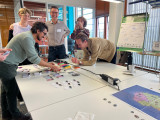
🎲♻️ Doe mee aan onze Life Cycle Analysis Serious Game!
Aanstaande dinsdag organiseren we onze Cyclum Vitae-serious game tijdens de Week van de Circulaire Economie!
Bij Cenex Nederland geloven we in het vertalen van kennis naar impact—en dat is precies waar Cyclum Vitae om draait. Dit boeiende bordspel neemt spelers mee op reis om de principes van een Life Cycle Analysis en de milieueffecten van product productie, gebruik en afvalverwerking te begrijpen.
🌱 Wat is de uitdaging? Spelers navigeren door realistische afwegingen, van het kiezen van materialen en productiemethoden tot het beheren van productgebruik en einde-levensduur. Het doel? Het meest duurzame product ontwerpen terwijl je concurrerend blijft in de markt.
📅 Wanneer: 18 maart, 14:00 - 16:00
📍 Waar: A-Lab, Overhoeksplein 2 (Lab 207)
Voor Engels- en Nederlandstaligen
🔗 Meld je aan via e-mail
Innovation Dinner - Cultuurverandering in de bouw
Op woensdag 26 maart organiseren BouwLab R&Do en 3D Makers Zone vanuit het programma van de EDIH het Innovation Dinner Cultuurverandering in de bouw.
De bouwsector staat op een keerpunt. Jarenlang werd er traditioneel en lineair gewerkt, maar de uitdagingen van vandaag - verduurzaming, digitalisering en circulariteit - vragen om een fundamentele transformatie. Wie niet meebeweegt, blijft achter.
Tijdens deze avond gaan we dieper in op de volgende thema's:
- Van afval naar waarde - Hoe maken we circulair bouwen de norm? Jaarlijks produceert de Nederlandse bouwsector meer dan 20 miljoen ton afval! In een wereld waar grondstoffen schaars worden, is dat onhoudbaar. Innovatieve bedrijven laten zien dat het anders kan. Gebouwen worden gesloopt met een materialenpaspoort, zodat onderdelen een tweede leven krijgen. Prefab houtbouw vervangt traditionele bouw, waardoor woningen sneller, lichter en met een lagere CO2-uitstoot gerealiseerd kunnen worden.
- Digitalisering als versneller - Hoe benutten we AI, digital twins en data? Ook digitalisering speelt een cruciale rol in de modernisering van de bouw. Digital twins, AI en big data kunnen bouwprocessen optimaliseren, terwijl drones en 3D-scans de veiligheid en nauwkeurigheid vergroten.
- <strong>Samenwerken of stagneren?</strong> - Hoe doorbreken we silo's en creëren we ketensamenwerking? Verandering komt alleen tot stand als bedrijven over hun eigen schaduw heen stappen. Ketensamenwerking, waarin partijen niet alleen contractueel maar ook inhoudelijk verantwoordelijkheid delen, is noodzakelijk voor circulariteit en digitalisering. Dat verlangt nieuwe verdienmodellen, waarbij niet alleen de laagste prijs maar de waarde op lange termijn centraal staat.
- Van traditie naar toekomst - Hoe breken we met oude patronen?
Looking for Internship Opportunities in Circular Economy – 6 Months

Hi,
I am a Master’s student at The Glasgow School of Art, specializing in Innovation Design and Circular Economy. Originally from Austria, I am very interested in gaining practical experience through a six-month internship in Amsterdam, a city known for its pioneering efforts in Circular Economy.
My goal is to build professional experience in this field and, ideally, to bring this knowledge back to Austria to help advance sustainable practices there.
For my Master’s thesis, I focused on the fashion industry, particularly on how the textile sector in Scotland can transition to a circular model, with a primary focus on my main stakeholder, <em>Johnston of Elgin</em>.
I would be very grateful to discuss any potential internship opportunities you might have. Please feel free to reach out to me!
Thank you very much for your time and consideration.
CV
https://drive.google.com/file/d/1fVwynP1zffNoemot534el961H-whrosY/view?usp=sharing
Best regards,
Larissa
𝗛𝗼𝘄 𝗰𝗮𝗻 𝗖𝗦𝗥𝗗 𝗯𝗲 𝘁𝗵𝗲 𝗹𝗮𝘂𝗻𝗰𝗵𝗽𝗮𝗱 for 𝘆𝗼𝘂𝗿 𝘀𝘂𝘀𝘁𝗮𝗶𝗻𝗮𝗯𝗶𝗹𝗶𝘁𝘆 𝗷𝗼𝘂𝗿𝗻𝗲𝘆?
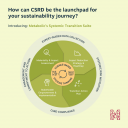
A systems approach is key.
Climate transition plans that lack a systemic perspective can unintentionally shift risks, disrupt supply chains, harm human rights, or even contribute to biodiversity loss. For example, switching to a low-carbon product that requires three times more land may address your carbon goals, but jeopardize your biodiversity targets.
Without considering these interdependencies, your climate strategy may become inefficient and require reworking as new issues arise.
𝗧𝗵𝗲 𝘀𝘆𝘀𝘁𝗲𝗺𝗶𝗰 𝘀𝗰𝗲𝗻𝗮𝗿𝗶𝗼👇
By addressing root causes and considering the ripple effects of climate decision-making in other areas, a systems lens ensures your plan goes beyond regulatory box-ticking.
Together, we can co-create effective action plans with your stakeholders and develop customized decision-making frameworks, accounting for material impacts on climate, nature, and people across your operations and value chain.
How? Learn how our Systemic Transition Suite can unlock your business’s full potential ⬇️
#BeyondCompliance #climatetransition #sustainabilityreporting #CSRD #ESG #circulareconomy
Waag Open: Alledaags activisme

Dat we met de klimaatcrisis voor een hele grote uitdaging staan, is voor veel mensen geen nieuwe informatie. Maar waar begin je als je hier iets tegen wilt doen? Voor veel mensen voelt het als een probleem dat te groot en lastig is om zelf mee te starten.
In het boek 'Alledaags activisme: van onrust naar daadkracht in het klimaat tijdperk' biedt klimaatfilosoof en activist Chris Julien een perspectief voor precies deze worsteling in onze rol in het grote klimaatvraagstuk. Middels wetenschappelijke, filosofische en persoonlijke inzichten laat hij zien dat we veel meer kunnen dan we denken: juist in het alledaagse zitten tal van mogelijkheden voor systeemverandering. Zo kun je met goede moed vooruit in het klimaattijdperk – of dat nu is op de snelweg, in de vergaderkamer of de sportkantine (of alledrie!).
Tijdens Waag Open zal Julien met een interactieve lezing over het boek en gezamenlijk gesprek ingaan op hoe je alledaags activisme in je eigen leven kunt toepassen.
Programma
| 19:30 - 19:45 uur | opening |
|---|---|
| 19:45 - 21:15 uur | lezing door Chris Julien & nagesprek |
| 21:30 - 22:00 uur | afsluitende borrel |
Waag Open
Elke eerste donderdagavond van de maand opent Waag haar deuren! Kom langs om te discussiëren en te doen. Want we gaan niet alleen in discussie over maatschappelijke thema's en de toekomst – je leert daarnaast ook altijd iets praktisch. Iets dat je altijd al hebt willen uitproberen, zoals de 3D-printer in het FabLab, of juist iets dat je nooit had verwacht, zoals uitpluizen hoe DNA in elkaar zit in ons biotech-lab. Waag Open vindt plaats in de maakplaatsen op de eerste en tweede verdieping van het historische Waaggebouw op de Nieuwmarkt.
Toegankelijkheid
Mocht je krap bij kas zitten en wel graag aan dit evenement willen deelnemen, neem dan contact op met sanna [@] waag [punt] org.
Playful Placemaking: Gamification and AI in Urban Design
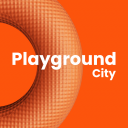
How can gamification reshape the way we design cities? 🤔
At Playground City 🛝, we’re excited to be part of <strong>Placemaking Week Europe 2024</strong>, which will take place in Rotterdam from <strong>September 24-27, 2024</strong>! 🎉
In collaboration with Studio Oa and <strong>City Makers</strong>, we’ll be hosting a session titled <strong>“Playful Placemaking: Gamification and AI in Urban Design”</strong>, under the Creating Place & Making It Last theme.
We’ll explore how gamification can improve the participatory process in placemaking, and how AI and digital tools can help us better understand and visualize changes in urban areas, using the Delfshaven area of Rotterdam as our case study 🌱🎮.
We look forward to connecting with you at the workshop, where we’ll explore how interactive, game-like elements and new technology can make urban design more inclusive, informed, and impactful.
Are you attending Placemaking Week? Let us know in the comments! We’d love to see you at our session.
Still need a ticket? Don’t wait—grab yours here: https://lnkd.in/eQQnUJVZ
Let’s create better cities together!
#Placemaking #UrbanDesign #SmartCities #CommunityEngagement #SustainableUrbanism #AIinUrbanPlanning #Gamification #RotterdamMakeItHappen #CreatingBetterCitiesTogether #PlacemakingEurope
Waag Open: Met je handen in de klei

Met je handen in de klei is een kleiworkshop met beeldend kunstenaar Esra Sakir in de Waag. Esra is artist in residence bij Voedselpark Amsterdam.
Doe mee en ontdek meer over Amsterdamse klei uit de Lutkemeerpolder. Een natuurlijk materiaal dat uitnodigt tot een gesprek over onze relatie met de grond en voedsel. Wat is nu een betere manier om ideeën te visualiseren dan met je handen in de klei? De workshop duur ongeveer twee uur en al het materiaal wordt door ons verzorgd.
Verzeker jezelf van een plek via de link.
Building local mini-economy within planetary boundaries

Scroll naar beneden voor de Nederlandse versie
Growth is an end in itself, dictates the current economic model. For only growth would keep our economy going and be indispensable to further sustainability. At the same time, our planet is being depleted by this drive for green growth.
Is it time to abandon economic growth as a social ideal? And then what are workable, more social alternatives?
More and more business owners are opting for sustainable operations. They settle for less financial gain to do valuable work with positive social and environmental impact. The rise of the commons movement, housing-, energy- and food cooperatives, as well as social initiatives in health and welfare, show that people want to stand together for values other than financial gain.
Achievable and real alternatives
New economic models offer different perspectives for considering the economy as part of a society. They offer tools to make that economy more equitable and sustainable. Yet the new economic thinking is still often dismissed as unrealistic and unachievable. Only by trying out these theories in practice can we demonstrate that these are real alternatives.
New economic thinking, New economic acting
To experiment with new economic theory and models in practice, the Amsterdam Economic Board has started the New Economic Models exploration. In April, we introduced the living lab project “New Economic Thinking, New Economic Acting” at the Marineterrein in Amsterdam. In this we work on socio-economic experiments, together with AMS Institute, AHK Culture Club, And The People, Bureau Marineterrein, Kennisland, The Next Speaker and the knowledge coalition ‘Art, Tech & Science’.
The Marineterrein is the ideal place to do this because it is an official experiment site. Moreover, companies located here are often already working on circular and social projects. Cultural institutions and organisations at the Marineterrein, in turn, can represent what thriving without economic growth could look like and fuel our desire for a new economy.
-----------------------------------------------------------------------------------------------------------------------
Bouwen aan lokale mini-economie binnen planetaire grenzen
Groei is een doel op zich, dicteert het huidige economische model. Want alleen groei zou onze economie draaiende houden en onmisbaar zijn om verder te verduurzamen. Tegelijkertijd raakt onze planeet uitgeput door die drang naar groene groei.
Wordt het tijd om economische groei als maatschappelijk ideaal los te laten? En wat zijn dan werkbare, socialere alternatieven?
Steeds meer ondernemers kiezen voor een duurzame bedrijfsvoering. Zij nemen genoegen met minder financiële winst om waardevol werk te kunnen doen, met positieve sociale en ecologische impact. De opkomst van de commons-beweging, woon-, energie- en voedselcoöperaties en maatschappelijke initiatieven in zorg en welzijn, laten zien dat mensen zich samen sterk willen maken voor andere waarden dan financieel gewin.
Haalbare en reële alternatieven
Nieuwe economische modellen bieden andere perspectieven om de economie als onderdeel van een samenleving te beschouwen. Ze bieden handvatten om die economie rechtvaardiger en duurzamer in te richten. Toch wordt het nieuwe economisch denken nog vaak weggezet als onrealistisch en niet haalbaar. Alleen door deze theorieën in de praktijk uit te proberen kunnen we aantonen dat dit reële alternatieven zijn.
Nieuw economisch denken, Nieuw economisch doen
Om te kunnen experimenteren met nieuwe economische theorie en modellen in de praktijk, verkent Amsterdam Economic Board deze in de verkenning Nieuwe economische modellen. In april introduceerden we het proeftuinproject ‘Nieuw economisch denken, Nieuw economisch doen’ op het Marineterrein in Amsterdam. Hierin werken we aan sociaaleconomische experimenten, samen met AMS Institute, AHK Culture Club, And The People, Bureau Marineterrein, Kennisland, The Next Speaker en de kenniscoalitie ‘Art, Tech & Science’.
Het Marineterrein is de ideale plek om dit te doen, omdat het een officieel ‘experimentterrein’ is. Bovendien zijn de hier gevestigde bedrijven vaak al bezig met circulaire en sociale projecten. Culturele instellingen en organisaties op het Marineterrein kunnen op hun beurt verbeelden hoe bloei zonder economische groei er uit kan zien en ons verlangen aanwakkeren naar een nieuwe economie.
Harmonious Cultural Cooperation In Amsterdam: Dutch & Chinese Young Talents United in the ENJOY AI NL Competition!

Harmonious Cultural Cooperation In Amsterdam: Dutch & Chinese Young Talents United in the ENJOY AI NL Competition!
Dear parents, enthusiastic young people, Dear school board and teachers,
We are excited to let you know about an exciting opportunity for your school and students! The ENJOY AI NL competition is coming to the Netherlands and we cordially invite your school to participate in this prestigious event.
Organized by the WailSalutem Foundation in collaboration with the Federation of Global Youth Artificial Intelligence, the ENJOY AI competition provides a platform for young innovators to showcase their creativity and develop their skills in robotics and AI.
What can you expect from the ENJOY AI NL competition:
– An exciting mix of robotics and AI challenges designed to explore the boundaries of STEAM.
– A unique opportunity for students aged 9-14 to demonstrate their talent and ingenuity.
– A stimulating experience in which Dutch students compete with 50 talented young minds from China in a cultural exchange and collaboration.
– A free introductory course for teachers and students on working with robots and programming them, in preparation for the competition.
– A lasting reward for your school, as each participating school will receive a robot set worth 325 euros after the competition, thanks to our valued partners WhalesBot and PMOT.
Event details: Date: July 14 Location: Sports Center VU – Uilenstede 100, 1183 AM Amstelveen
Participation in the ENJOY AI NL competition is free, and we strongly encourage your school to participate and give your students the opportunity to explore and develop their passion for technology.
For more information and to register your school, please contact us at
info@wailsalutem-foundation.com
https://www.linkedin.com/feed/update/urn:li:activity:7196094012175400961/
We look forward to welcoming you and your students to the ENJOY AI NL competition and creating an unforgettable experience together!
Yours sincerely,
WailSalutem Foundation
https://wailsalutem-foundation.com/
OPEN CALL Placemaking Week Europe 2024
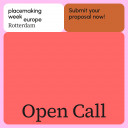
Get ready for an exciting experience at the 7th Annual Placemaking Week Europe (PWE) in Rotterdam, Netherlands, from September 24-27, 2024! 🚀
Join us as we co-create an unforgettable programme! Do you have a game-changing project, research, or workshop to share? We want to hear from you!
This year’s festival revolves around four compelling themes:
1. Creating Place & Making It Last
2. Climate Adaptation: Together Towards Change
3. Living with Water: The Flow of the City
4. Local Power & The Battle for Space
Submit your proposals by May 19, 2024, and shape the future of urban spaces with us! Don’t miss out on this opportunity to make a difference! Join us in Rotterdam and let’s build better cities, one idea at a time! ✨
You can find all the open call info and application instructions here.
More information about PWE'24 on our official website.
😀Is betrokkenheid van de gemeenschap de moeite waard? Enquête van 1 minuut😀

Hallo allemaal, Fijne Donderdag, 😀 (English below)
Wij willen graag begrijpen en leren oof participatie in de gebouwde omgeving de moeite waard is en welke uitdagingen je daarbij bent tegengekomen.
Vul deze enquête van 30 seconden (max. 1 minuut) in en kijk wat andere professionals ervaren.
Thank you,
Playground Team
www.plgrnd.city
----------------
Hello all, Happy Thursday, 😀
We would like to understand and learn if participation in the built environment is worth it and what challenges you have experienced with it.
Please complete this 30-second (max 1 minute) survey and see what other professionals experience.
Cheers,
Playground Team
True Price Lab is launched

The True Price Lab is a project focusing on willingness to pay the true price for food and drink.
From 26 February to mid-June 2024, the restaurant and espresso bar in the Corry Tendeloo Building of the Amsterdam University of Applied Sciences will be dedicated to the True Price Lab. For four months, students and staff will be able to choose between paying the normal or true price for a number of products. This project is an initial exploration of consumers' willingness to pay the true price, which includes hidden environmental and social-impact costs.
True price versus consumer price
The true price can be defined as the price applicable after calculating and improving the true price of a product. The true price is based on the retail price plus the sum total of external social and environmental costs. Traditional pricing disregards these external costs, which are effectively paid for by society. For example, the retail price of a cup of coffee does not include the environmental damage of pest control or the underpayment of the farmers who grow the coffee.
The full extra amount that participants pay when they voluntarily opt for the true price will go to the non-profit organisation Solidaridad. Solidaridad wants to make the world a place where everything is made and bought in solidarity with people, the environment and future generations. Visitors to the restaurant and espresso bar can learn more about what their contributions will be used for by scanning a QR code.
Community Meetup Amsterdam Donut Coalition!
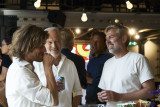
Amsterdam Donut Coalitie Community Meetup!
Op 29 februari organiseert de Amsterdam Donut Coalitie een community meetup in Noord over het voedselvraagstuk.
Voedsel is een essentiële behoefte met aanzienlijke invloed op het milieu. Daarnaast verbindt het gemeenschappen. Daarom organiseren wij een meetup om initiatieven uit Noord, Zuidoost en Nieuw-West samen te brengen en in gesprek te laten gaan.
Op deze bijeenkomst zullen inspirerende initiatieven zoals Tuindorp Delicious, Wortel met Sjeu en Tuinen van Brasa hun inzichten delen over hun aanpak en de rol die de donut economie speelt in de transformatie van voedselsystemen.
Vervolgens gaan we in groepen uiteen om samen het thema voedsel te onderzoeken vanuit de 4 lenzen. Wat gebeurt er als je voedsel bekijkt vanuit een sociaal, ecologisch, lokaal of globaal perspectief?
Dit wordt een waardevolle gelegenheid om te leren, te delen en gezamenlijk na te denken over de toekomst van ons voedselsysteem. Breng je nieuwsgierigheid, ideeën en enthousiasme mee!
🗓️ Datum: Donderdag 29 februari
🕒 Tijd: 16:00-17:30
📍 Locatie: Noord, Tuindorp Delicious, Zonneplein 18a, 1033 EK Amsterdam
Schrijf je hier in: https://forms.gle/jidLbQfjdKbHzNXu9
Demoday #22: Navigating eco-emotions: The impact of working in sustainability on your mental wellbeing
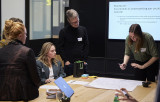
Professionals in the field of circularity and sustainability may experience "eco-emotions," a spectrum of feelings which can have both negative and positive effects on mental health. Eco-emotions arise from ecological crises, such as climate change, and can lead to stress, fatigue, and a sense of powerlessness, but also heightened motivation for professionals.
This work session, led by Marian Zandbergen (CIRCOLLAB, HvA) and moderated by Mareille de Bloois (Royal HaskoningDHV) on the 14th of December, explored the challenges and opportunities associated with eco-emotions, both personally and within organizations. The key question addressed was: How can individuals and organisations constructively manage eco-emotions, and what implications does this have for organisations?
Defining eco-emotions
Eco-emotions are feelings resulting from ecological crises, which can be categorized into backward-looking and forward-looking emotions.
- Backward-looking eco-emotions: include eco-guilt, eco-grief, and eco-anger about past events, such as feeling guilty about the carbon footprint of a vacation flight.
- Forward-looking eco-emotions: encompass eco-anxiety, and focus on current and anticipated future decisions. While eco-anxiety can drive proactive engagement with ecological issues, excessive amounts may lead to feelings of helplessness.
Negative eco-emotions can thus harm your mental health and can even lead to burnout. Therefore, it is important to use strategies to counter the negative effects of eco-anxiety.
Changing attitudes - taking action
Attitudes shape behaviour, and self-efficacy—the belief in one's ability to contribute to problem-solving—is crucial. Concrete action perspectives empower individuals, fostering a sense of control over problems and mitigating feelings of helplessness of eco-anxiety.
Social support - acting as a group
Collaborative efforts within a group can positively impact perceived self-efficacy. Strong collaboration can turn negative effects of eco-anxiety into positive outcomes. Trust and shared motivation play vital roles in effective collaborations, fostering understanding across personal and organisational perspectives.
In the group - recognition and solutions
The participants of the workshop shared personal experiences of eco-emotions and brainstormed constructive ways to incorporate these emotions into circular transition collaborations. Ideas included conducting organizational research to understand the extent of eco-emotions and gain insight into personal motivations in businesses and collaboration, and demonstrating how intrinsic beliefs contribute to shared goals.
Proposed solutions
To address eco-emotions within organizations, various methods were proposed, including workshops with inspiration and practical applications, an HR framework, 'meet & share' sessions featuring talks with industry leaders, and personal purpose hours.
Marian expressed a desire to continue researching this topic, inviting contributions through qualitative interviews within organizations. Are you interested in contributing to this research, please let me know in the comments, or email me at noor@amsterdamsmartcity.com.
Waag Open: miso magic
Wegens succes herhaald!
Nederland is een broodland. We eten tussen de middag het liefst een ouderwets bammetje met kaas. Maar wat te doen met al dat oude brood?
Erika Hirose ontwikkelde een ‘kit’ waarmee je van oud brood Japanse miso kan maken. Erika haar man, Martin, koppelt de data van het fermentatieproces via sensoren aan geluid. Tijdens deze Waag Open editie kan je zelf aan de slag met het maken van miso én muziek. Neem je oude, overgebleven brood mee. Restjes aardappels pasta, rijst of noodles rijst mag ook.
Het belooft een avond te worden voor alle zintuigen!
Programma
19.15 - 19.30 uur Inloop
19:30 - 19:45 uur Welkom
19:45 - 20:15 uur Geschiedenis van Miso (en voedselverspilling)
20:15 - 21:15 uur Miso maken
21:15 - 21:30 uur Testen en proeven
21.30- 22:00 uur Borrel
Waag Open
Elke eerste donderdagavond van de maand opent Waag haar deuren! Kom langs om te discussiëren en te doen. Want we gaan niet alleen in discussie over maatschappelijke thema's en de toekomst - je leert daarnaast ook altijd iets praktisch.
Iets dat je altijd al hebt willen uitproberen, zoals de 3D-printer in het FabLab, of juist iets dat je nooit had verwacht, zoals uitpluizen hoe DNA in elkaar zit in ons biotech-lab. Waag Open vindt plaats in (een van) de maakplaatsen op de eerste en tweede verdieping van het historische Waaggebouw op de Nieuwmarkt.
Toegankelijkheid
Omdat het Waag-gebouw een beschermd monumentaal pand is, is het helaas niet voorzien van een lift. Dit evenement vindt plaats in de Makersguild op de eerste verdieping van het Waag-gebouw.
Mocht je krap bij kas zitten en wel graag aan dit evenement willen deelnemen, neem dan contact op met tanja [@] waag [punt] org.
Research project - Shifting circular: urban infrastructure and policy changes towards renewed territorial metabolisms
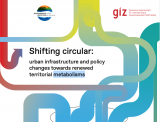
Find out this comparative analysis of critical policies and infrastructures essential for advancing the urban circular transition!
This piece of work draws upon the insights garnered from the experiences of four European cities, including Amsterdam. Reflecting on pivotal levers and obstacles pivotal in catalyzing socio-ecological transformations towards alternative urban metabolisms forms the crux of this exploration. This insightful report, commissioned by the Deutsche Gesellschaft für Internationale Zusammenarbeit (GIZ), the German agency for international cooperation, has been recently unveiled within the Circular Economy Solutions Dialogue (CESD) under the auspices of the Think20 (T20) working group focused on sustainable urbanization.
As a PhD researcher, I am now embarked on another research project on circular policies and strategies. One of my fieldwork is based in Amsterdam, spanning from January to April 2024. I am enthusiastic about establishing connections and potentially collaborating during my stay in the city!
Stay up to date
Get notified about new updates, opportunities or events that match your interests.

